 Summary: You may have read our recent post explaining that despite Bing powering Yahoo!'s search results, the 2 engines' results can actually still be quite different. What you probably didn't notice were some adult-themed shopping results that managed to find their way into the results of an innocent "halloween" search I had done (and the screenshot I used!). Today we take a look at Bing's NSFW search results and their history of problems in this arena. (Spoiler Alert: This ain't their first rodeo.
Summary: You may have read our recent post explaining that despite Bing powering Yahoo!'s search results, the 2 engines' results can actually still be quite different. What you probably didn't notice were some adult-themed shopping results that managed to find their way into the results of an innocent "halloween" search I had done (and the screenshot I used!). Today we take a look at Bing's NSFW search results and their history of problems in this arena. (Spoiler Alert: This ain't their first rodeo.)
Last week while assembling screenshots for my post on
Bing powered Yahoo! results (and how each engine is still producing widely varying results), I noticed something a little strange in Bing's search results for the keyword "halloween". It's nothing major, but it's one of those quirky little items I felt deserved to be highlighted in it's own post. Click the image below to enlarge and see if you can spot what I'm talking about:
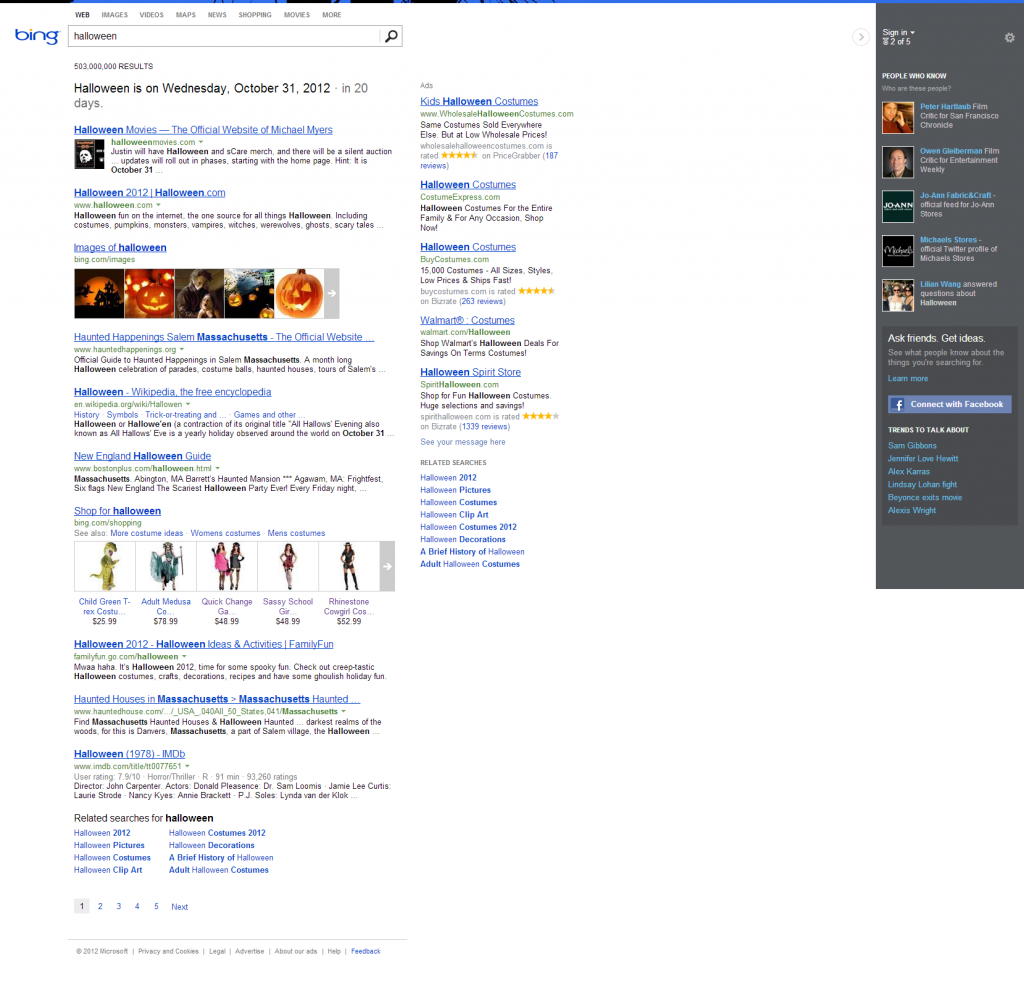
Still not seeing it? Maybe this will help:
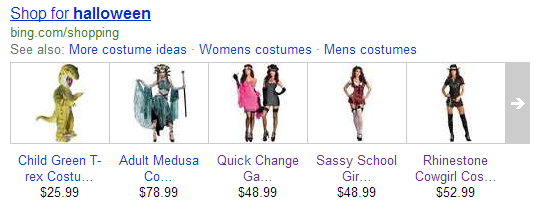
Pulling a carousel/filmstrip of shopping results into the middle of organic results isn't anything new, and is often very useful, but isn't it a little strange to be showing a "child green t-rex costume" next to 4, shall we say "adult" themed costumes for women? Admittedly none of them contained the word "sexy" or anything like that (other than "Adult" Medusa), so I clicked through a few to investigate (stop laughing!) why Bing's shopping search algorithm wouldn't be filtering out these clearly adult oriented images/products, but I didn't find much. I half expected to find them miscategorized or something, but it doesnt't even appear that Bing Shopping has that level of sophistication built in. What I did discover, though, was that Bing listed simply "Halloween" under merchant info which may factor in.
The screenshot above is actually from last Thursday, by the way, so I thought it was worth seeing if anything had changed early Friday and it had, but not for the better:
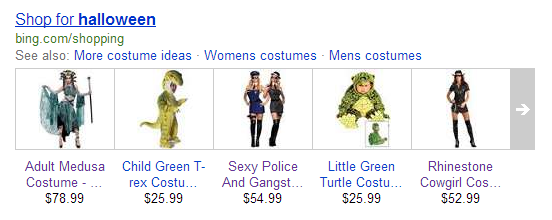
A new baby costume was thrown in the mix, but so was "sexy police and gangster costume", and they were now even more mixed together - every other was an "adult" costume, with children's costumes in between.
Now, I should point out that I'm not criticizing Bing's ability to return relevant results (in this case), because those are "halloween costumes", which one would expect to find in shopping results for "halloween". The concern is small children finding these items when innocently looking for (age appropriate) Halloween costumes. I know I wouldn't want my 8 and 10 year old nieces to stumble on those. I probably also wouldn't want to be caught with these search results on my screen at work! So again, it's not a relevancy issue here, but an interesting oversight on Bing's part, given that they do a pretty good job of not showing other "adult" results that could be harmful to kids. Admittedly, the risk of "harm" is much less here because we're not talking about pornography, but again - these aren't things you'd want your young children seeing.
It's also worth noting that this isn't the first time Bing has had issues like this. SEO Diva caught an interesting "related results" example back in
June 2009. And then there's the
tragic 2009 case of CNET executive editor Molly Wood, not to be confused with the porn star who shares her name. Or in Bing's case, very much to be confused with her. In fact Bing essentially calls you a sicko when you try to do an image search for Molly Wood:

Okay, they don't really cast aspersions, but they do warn you and force you to change your "SafeSearch" settings before they'll display the results. An understandable protection to prevent innocent eyes from unintentionally seeing things they can't unsee. Equally interesting are the video results Bing pulls into the standard organic results for "molly wood" (click to enlarge):
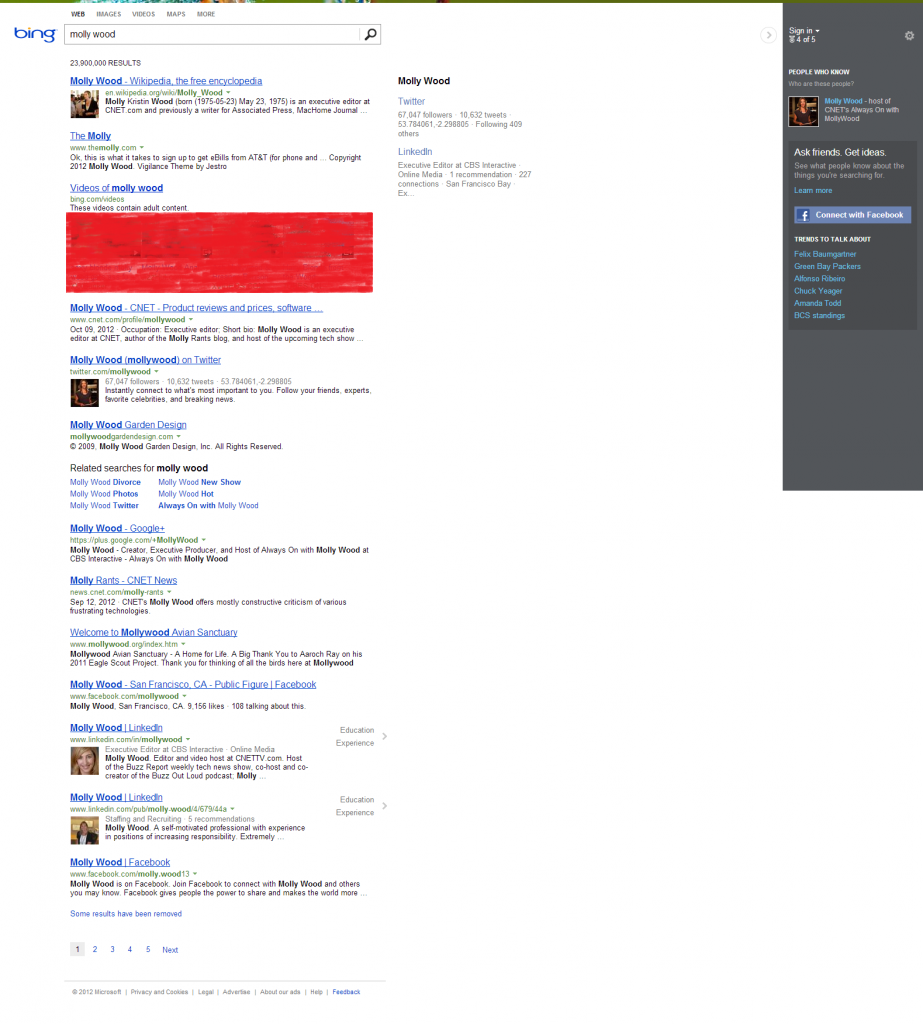
As you can see, I've added a red box to block out the the names of the videos and what were already blurred video previews. Let's just say that despite blurring, if you have any imagination you could still tell what was going on and it wasn't exactly PG-13. The titles weren't any better. But again, the reason this is all important is because it's the result of a simple Bing search on the name 'molly wood'.
Click here to see the unedited search results page - and don't feel bad, you're just doing an innocent search for the name of an executive editor at CNET. Needless to say I didn't click on any of those preview images, but it's pretty concerning that you could be only a single click away from these types of videos without even deliberately seeking adult material.
I should also point out that despite the fact that Bing does indeed power Yahoo!'s organic search results, an image search for 'molly wood' is another example of how the two search engines differ, and it's unlike any of the examples I highlighted in
my earlier post. In that post, I pointed out that Yahoo! and Bing seemed to be using the same ranking algorithm for image results now - it was just the sample number shown within organics that varied. But in this case, Bing won't even show you image results for 'molly wood' until you change your SafeSearch settings (which means you'll probably see a lot of porn), while Yahoo! shows you images appropriate for all ages.
This is really quite puzzling because we know they're using the same algorithm, but Yahoo! seems more advanced in how they choose to filter out adult images by default whereas Bing doesn't even provide an option for your to see non-adult image results for 'molly wood'. And this is 3 years after CNET's Molly Wood pointed out the issue! For what it's wroth Yahoo!'s video results are innocent enough as well. Same goes for Google's image and video results for 'molly wood'. Microsoft, if you want to be treated like a big boy you've got to put on your big boy pants.... Okay, that sounds weird given the context of what we've been discussing, but you catch my drift - the search engine that holds a very distant #2 position in search market share has some 'splainin to do.
*UPDATE* - After publishing this post it occurred to me that I hadn't checked the 'molly wood' Bing search on my phone. I did this just now, and here's what I see:
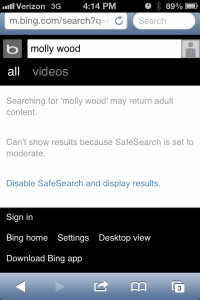
 Summary: You may have read our recent post explaining that despite Bing powering Yahoo!'s search results, the 2 engines' results can actually still be quite different. What you probably didn't notice were some adult-themed shopping results that managed to find their way into the results of an innocent "halloween" search I had done (and the screenshot I used!). Today we take a look at Bing's NSFW search results and their history of problems in this arena. (Spoiler Alert: This ain't their first rodeo.)
Last week while assembling screenshots for my post on Bing powered Yahoo! results (and how each engine is still producing widely varying results), I noticed something a little strange in Bing's search results for the keyword "halloween". It's nothing major, but it's one of those quirky little items I felt deserved to be highlighted in it's own post. Click the image below to enlarge and see if you can spot what I'm talking about:
Summary: You may have read our recent post explaining that despite Bing powering Yahoo!'s search results, the 2 engines' results can actually still be quite different. What you probably didn't notice were some adult-themed shopping results that managed to find their way into the results of an innocent "halloween" search I had done (and the screenshot I used!). Today we take a look at Bing's NSFW search results and their history of problems in this arena. (Spoiler Alert: This ain't their first rodeo.)
Last week while assembling screenshots for my post on Bing powered Yahoo! results (and how each engine is still producing widely varying results), I noticed something a little strange in Bing's search results for the keyword "halloween". It's nothing major, but it's one of those quirky little items I felt deserved to be highlighted in it's own post. Click the image below to enlarge and see if you can spot what I'm talking about:
 Still not seeing it? Maybe this will help:
Still not seeing it? Maybe this will help:
 Pulling a carousel/filmstrip of shopping results into the middle of organic results isn't anything new, and is often very useful, but isn't it a little strange to be showing a "child green t-rex costume" next to 4, shall we say "adult" themed costumes for women? Admittedly none of them contained the word "sexy" or anything like that (other than "Adult" Medusa), so I clicked through a few to investigate (stop laughing!) why Bing's shopping search algorithm wouldn't be filtering out these clearly adult oriented images/products, but I didn't find much. I half expected to find them miscategorized or something, but it doesnt't even appear that Bing Shopping has that level of sophistication built in. What I did discover, though, was that Bing listed simply "Halloween" under merchant info which may factor in.
The screenshot above is actually from last Thursday, by the way, so I thought it was worth seeing if anything had changed early Friday and it had, but not for the better:
Pulling a carousel/filmstrip of shopping results into the middle of organic results isn't anything new, and is often very useful, but isn't it a little strange to be showing a "child green t-rex costume" next to 4, shall we say "adult" themed costumes for women? Admittedly none of them contained the word "sexy" or anything like that (other than "Adult" Medusa), so I clicked through a few to investigate (stop laughing!) why Bing's shopping search algorithm wouldn't be filtering out these clearly adult oriented images/products, but I didn't find much. I half expected to find them miscategorized or something, but it doesnt't even appear that Bing Shopping has that level of sophistication built in. What I did discover, though, was that Bing listed simply "Halloween" under merchant info which may factor in.
The screenshot above is actually from last Thursday, by the way, so I thought it was worth seeing if anything had changed early Friday and it had, but not for the better:
 A new baby costume was thrown in the mix, but so was "sexy police and gangster costume", and they were now even more mixed together - every other was an "adult" costume, with children's costumes in between.
Now, I should point out that I'm not criticizing Bing's ability to return relevant results (in this case), because those are "halloween costumes", which one would expect to find in shopping results for "halloween". The concern is small children finding these items when innocently looking for (age appropriate) Halloween costumes. I know I wouldn't want my 8 and 10 year old nieces to stumble on those. I probably also wouldn't want to be caught with these search results on my screen at work! So again, it's not a relevancy issue here, but an interesting oversight on Bing's part, given that they do a pretty good job of not showing other "adult" results that could be harmful to kids. Admittedly, the risk of "harm" is much less here because we're not talking about pornography, but again - these aren't things you'd want your young children seeing.
It's also worth noting that this isn't the first time Bing has had issues like this. SEO Diva caught an interesting "related results" example back in June 2009. And then there's the tragic 2009 case of CNET executive editor Molly Wood, not to be confused with the porn star who shares her name. Or in Bing's case, very much to be confused with her. In fact Bing essentially calls you a sicko when you try to do an image search for Molly Wood:
A new baby costume was thrown in the mix, but so was "sexy police and gangster costume", and they were now even more mixed together - every other was an "adult" costume, with children's costumes in between.
Now, I should point out that I'm not criticizing Bing's ability to return relevant results (in this case), because those are "halloween costumes", which one would expect to find in shopping results for "halloween". The concern is small children finding these items when innocently looking for (age appropriate) Halloween costumes. I know I wouldn't want my 8 and 10 year old nieces to stumble on those. I probably also wouldn't want to be caught with these search results on my screen at work! So again, it's not a relevancy issue here, but an interesting oversight on Bing's part, given that they do a pretty good job of not showing other "adult" results that could be harmful to kids. Admittedly, the risk of "harm" is much less here because we're not talking about pornography, but again - these aren't things you'd want your young children seeing.
It's also worth noting that this isn't the first time Bing has had issues like this. SEO Diva caught an interesting "related results" example back in June 2009. And then there's the tragic 2009 case of CNET executive editor Molly Wood, not to be confused with the porn star who shares her name. Or in Bing's case, very much to be confused with her. In fact Bing essentially calls you a sicko when you try to do an image search for Molly Wood:
 Okay, they don't really cast aspersions, but they do warn you and force you to change your "SafeSearch" settings before they'll display the results. An understandable protection to prevent innocent eyes from unintentionally seeing things they can't unsee. Equally interesting are the video results Bing pulls into the standard organic results for "molly wood" (click to enlarge):
Okay, they don't really cast aspersions, but they do warn you and force you to change your "SafeSearch" settings before they'll display the results. An understandable protection to prevent innocent eyes from unintentionally seeing things they can't unsee. Equally interesting are the video results Bing pulls into the standard organic results for "molly wood" (click to enlarge):
 As you can see, I've added a red box to block out the the names of the videos and what were already blurred video previews. Let's just say that despite blurring, if you have any imagination you could still tell what was going on and it wasn't exactly PG-13. The titles weren't any better. But again, the reason this is all important is because it's the result of a simple Bing search on the name 'molly wood'. Click here to see the unedited search results page - and don't feel bad, you're just doing an innocent search for the name of an executive editor at CNET. Needless to say I didn't click on any of those preview images, but it's pretty concerning that you could be only a single click away from these types of videos without even deliberately seeking adult material.
I should also point out that despite the fact that Bing does indeed power Yahoo!'s organic search results, an image search for 'molly wood' is another example of how the two search engines differ, and it's unlike any of the examples I highlighted in my earlier post. In that post, I pointed out that Yahoo! and Bing seemed to be using the same ranking algorithm for image results now - it was just the sample number shown within organics that varied. But in this case, Bing won't even show you image results for 'molly wood' until you change your SafeSearch settings (which means you'll probably see a lot of porn), while Yahoo! shows you images appropriate for all ages.
This is really quite puzzling because we know they're using the same algorithm, but Yahoo! seems more advanced in how they choose to filter out adult images by default whereas Bing doesn't even provide an option for your to see non-adult image results for 'molly wood'. And this is 3 years after CNET's Molly Wood pointed out the issue! For what it's wroth Yahoo!'s video results are innocent enough as well. Same goes for Google's image and video results for 'molly wood'. Microsoft, if you want to be treated like a big boy you've got to put on your big boy pants.... Okay, that sounds weird given the context of what we've been discussing, but you catch my drift - the search engine that holds a very distant #2 position in search market share has some 'splainin to do.
*UPDATE* - After publishing this post it occurred to me that I hadn't checked the 'molly wood' Bing search on my phone. I did this just now, and here's what I see:
As you can see, I've added a red box to block out the the names of the videos and what were already blurred video previews. Let's just say that despite blurring, if you have any imagination you could still tell what was going on and it wasn't exactly PG-13. The titles weren't any better. But again, the reason this is all important is because it's the result of a simple Bing search on the name 'molly wood'. Click here to see the unedited search results page - and don't feel bad, you're just doing an innocent search for the name of an executive editor at CNET. Needless to say I didn't click on any of those preview images, but it's pretty concerning that you could be only a single click away from these types of videos without even deliberately seeking adult material.
I should also point out that despite the fact that Bing does indeed power Yahoo!'s organic search results, an image search for 'molly wood' is another example of how the two search engines differ, and it's unlike any of the examples I highlighted in my earlier post. In that post, I pointed out that Yahoo! and Bing seemed to be using the same ranking algorithm for image results now - it was just the sample number shown within organics that varied. But in this case, Bing won't even show you image results for 'molly wood' until you change your SafeSearch settings (which means you'll probably see a lot of porn), while Yahoo! shows you images appropriate for all ages.
This is really quite puzzling because we know they're using the same algorithm, but Yahoo! seems more advanced in how they choose to filter out adult images by default whereas Bing doesn't even provide an option for your to see non-adult image results for 'molly wood'. And this is 3 years after CNET's Molly Wood pointed out the issue! For what it's wroth Yahoo!'s video results are innocent enough as well. Same goes for Google's image and video results for 'molly wood'. Microsoft, if you want to be treated like a big boy you've got to put on your big boy pants.... Okay, that sounds weird given the context of what we've been discussing, but you catch my drift - the search engine that holds a very distant #2 position in search market share has some 'splainin to do.
*UPDATE* - After publishing this post it occurred to me that I hadn't checked the 'molly wood' Bing search on my phone. I did this just now, and here's what I see:

